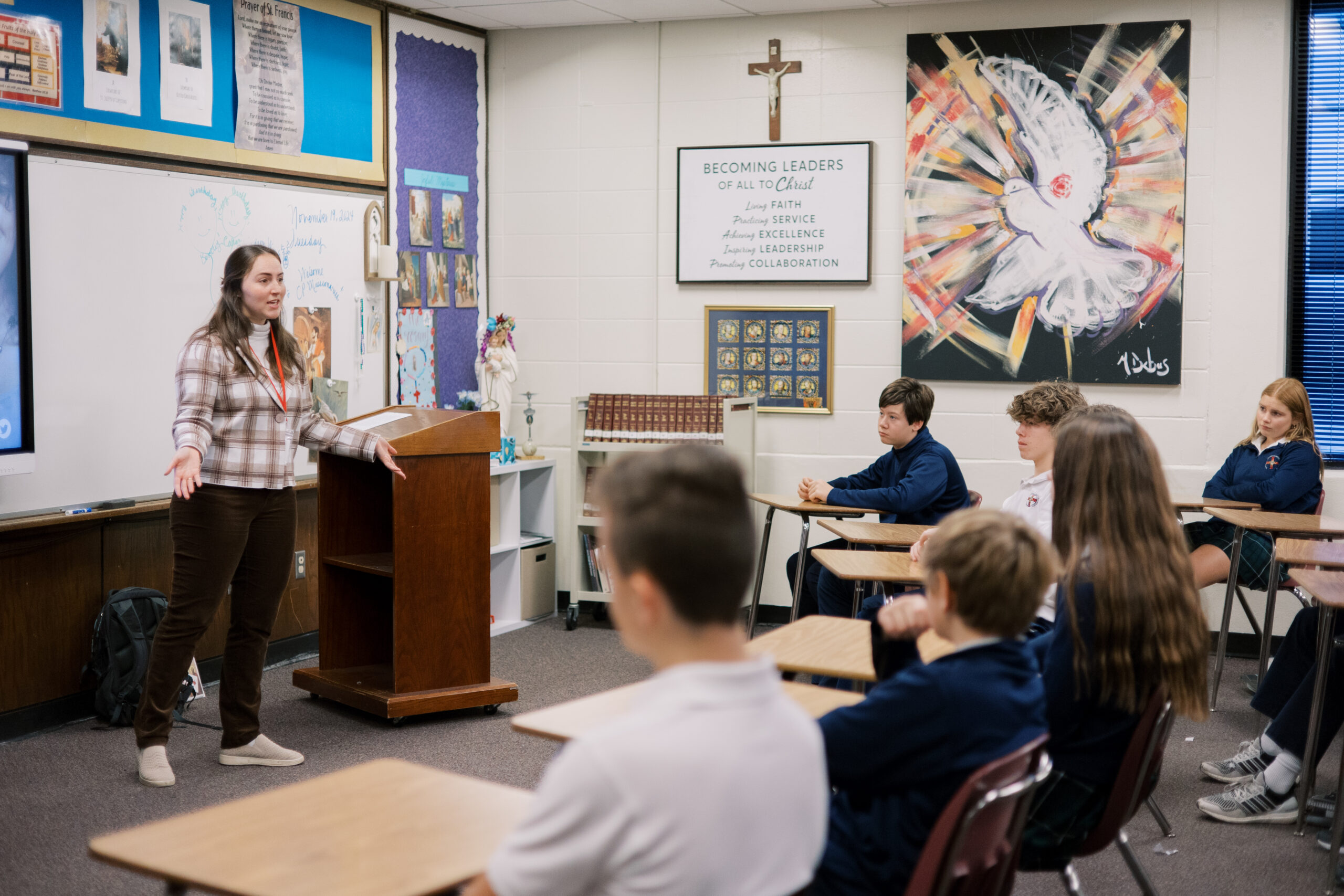
A missionary from The Culture Project talks to a class Nov. 19 at St. Robert Bellarmine School in Omaha. JILLIAN PAYNE/THE CULTURE PROJECT INTERNATIONAL
Equipping Disciples
Missionaries look to teens, young adults to transform the culture
November 21, 2024
Addictions, sex outside of marriage, abortion, gender confusion, same-sex attraction, divorce, pornography, anxiety, depression, isolation.
Young people know personally and painfully the problems of the culture they live in.
But now, in the Archdiocese of Omaha and elsewhere, they’re about to become the solution.
For more than a year, The Culture Project has been at work in schools, parishes, youth groups, retreats and young adult gatherings in the archdiocese, digging at the roots of what Pope Saint John Paul II called the culture of death.
The Culture Project is a growing nationwide organization that brings young missionaries to dioceses, including the Archdiocese of Omaha, to reach other young people and to bring about cultural change.
Here, in both urban and rural communities, a team of five missionaries has been getting to know young people and asking them to consider deeper questions, such as “Who am I?” and “What am I made for?”
They talk about human dignity, sexual integrity and healthy use of social media.
And gradually, they are transforming the lives of individuals and the culture as a whole.
The initiative is one of “young people set out to restore culture through the experience of virtue,” said Greg Schleppenbach, chief executive officer of The Culture Project.
The organization has sobering statistics on its website: 27% of teens say they are having sex; 63% of 12-graders say they’ve had sex; 2,300 abortions are performed every day; one in seven teens sends sexts; and one in four receives sexts.
“The culture hands you counterfeit versions of love and freedom, promising to satisfy your deepest desires, but instead leaves you feeling anxious, overwhelmed, and unfulfilled,” the website said. Through social media and the Internet, “we’re more connected than ever before, yet, for so many, online culture has fueled comparison, loneliness, and unhealthy habits.”
The Culture Project, however, offers an alternative: “We talk to students about human dignity, self worth, and how living a virtuous life can change the world.”
The mission has taken off in the Archdiocese of Omaha.
Archbishop George J. Lucas has been “on board from the beginning, that this would be a great service to our schools, a great service to our parishes,” said Jodi Phillips, who works for the archdiocese as a coach and youth evangelization specialist. She was instrumental in bringing The Culture Project to the archdiocese.
“The Culture Project has my commendation and support,” the archbishop has said, “for its work presenting to youth and young adults the truth of human dignity, the benefits of sexual integrity and healthy social media use.
“I am particularly pleased that The Culture Project presents information in a way that engages young people, connects with them and helps bring their Catholic faith to life.”
Active in the pro-life movement in Nebraska and nationally for decades, Schleppenbach said: “It’s very, very clear that if we want to fundamentally and substantially change the direction of our culture, we have to invest more in the young people, and particularly middle and high school students.”
“One of the great things I recognize – especially in my more than 30 years of doing pro-life work within the Church – is that the primary work of the pro-life movement has been fighting the supply side of the abortion industry, trying to pass protective laws, trying to support pregnant women, and those kind of things,” he said.
“What we haven’t done as much as a movement is … addressing the demand side, trying to reach young men and women earlier in their lives and helping them get on the right path, avoid the destructive paths that this culture wants to send them down: sexual license and pornography” and other unhealthy paths “that can be very difficult to get out of.”
“That has implications to certainly abortion,” he said, but also to marriage and family, divorce, mental health and suicides.
“So that’s where we – as a Culture of Life, as a Church – have to operate. We have to lean much more into our young people, in helping them get on the right path earlier, before Planned Parenthood and the Culture of Death gets their tentacles onto our young people.”
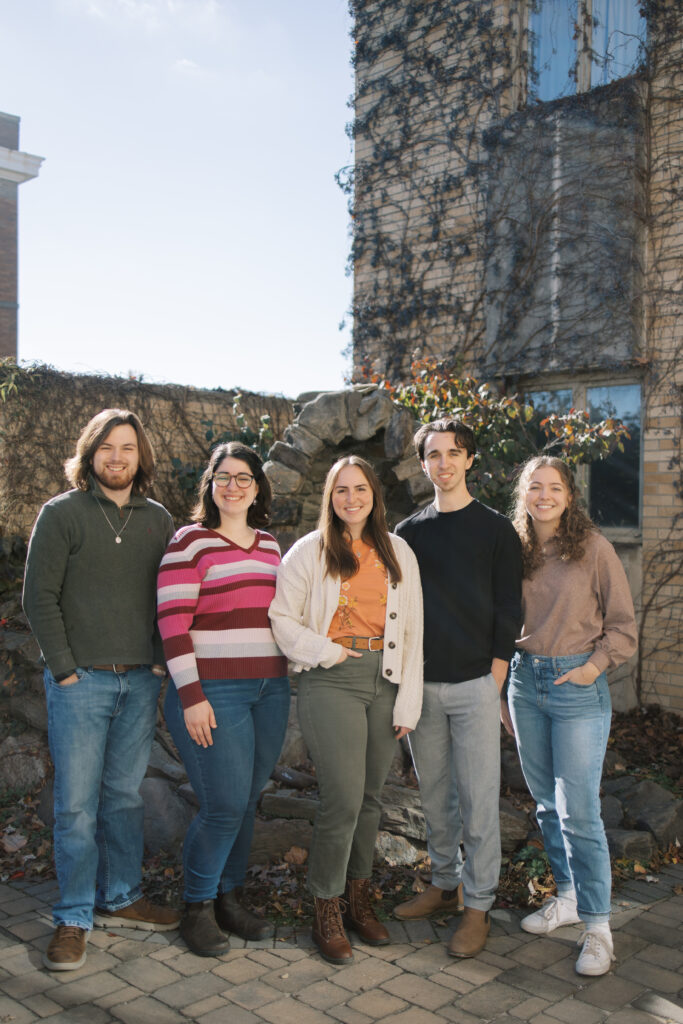
The Culture Project missionaries serving the archdiocese this year are, from left, Jimmy Schomburg, Anamaria Paulus, Danielle Blattman, Bernie Senger and Sami Boehm. JILLIAN PAYNE/THE CULTURE PROJECT INTERNATIONAL
The Culture Project strives to embody the leadership of Pope St. John Paul II in building a new civilization of life and love.
St. John Paul II wrote that it’s an illusion to think people can build a true Culture of Life if they don’t help the young experience, understand and live authentic human sexuality and love, Schleppenbach noted.
“Nobody knew the culture better than John Paul II,” he said, “and where he focused his efforts to try to change it was reaching the young.”
When The Culture Project missionaries speak about human dignity, they use principles from the saint’s Theology of the Body, which helps people understand who they are, where their dignity comes from and what they’re made for as children of God.
“By laying that foundation, it helps them to spot the counterfeits, the false notions of love and dignity and identity,” Schleppenbach said.
“So rather than telling them this is what the Church believes and this is why they should believe it, it’s like no, here’s who you are, what you’re made for, so that they can come to that conclusion themselves, which is much more effective.”
The Culture Project’s missionaries go to high schools, youth groups, retreats and young adult gatherings to give presentations. But they also serve as mentors, by making themselves available for further questions and conversations and by showing up for young people at their games, performances and competitions.
The missionaries have been trained by specialists in theology, psychology, reproductive health, pro-life apologetics and more. They approach tough topics with respect and sensitivity.
The missionaries visit Roncalli Catholic High School in Omaha at least monthly. They’ve given talks, but they’ve also spent time building relationships with students, especially at lunch and during peer ministry meetings, said Clare Fletcher, a campus minister at Roncalli.
On “Frisbee Fridays” at the high school, they show up to play. They were in the audience at the high school’s musical and will likely show up at Roncalli’s Christmas concert, Fletcher said.
“It’s really important to support our students in the things that they’re most interested in and passionate about,” she said. “Building those relationships is just often being present.”
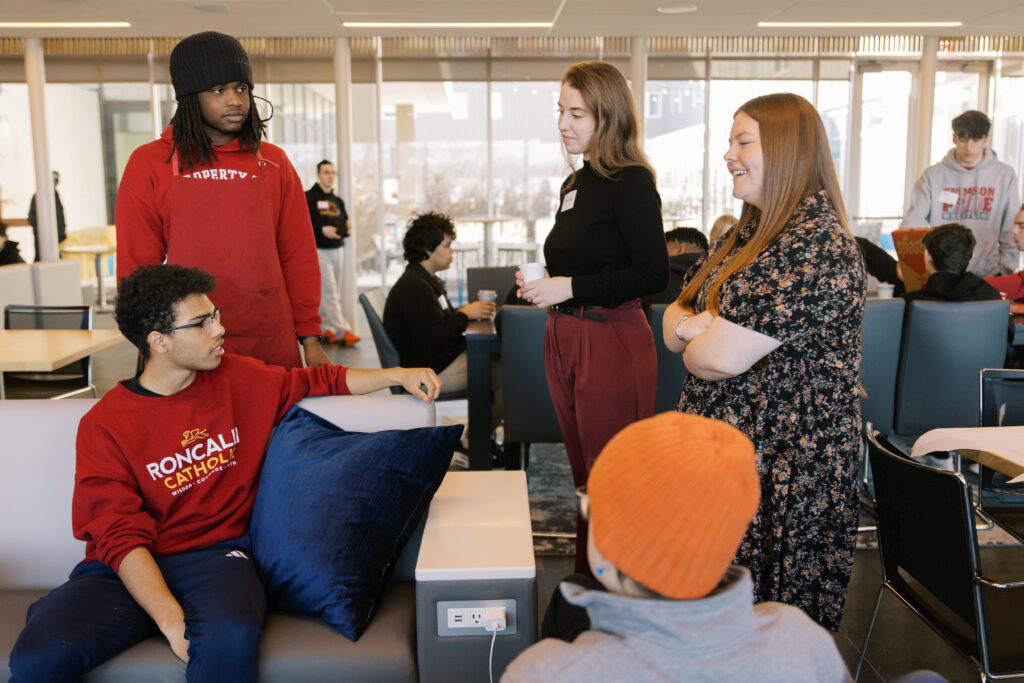
Missionaries chat with students at Roncalli Catholic High School during the 2023-24 school year. THE CULTURE PROJECT
The missionaries talk to parents, too, to address questions like: “How do I talk to my kids about sexuality?”
The Culture Project missionaries typically commit to one year of service after college graduation.
Over the summer and into the fall, they receive six or seven weeks of formal training that includes formation by Benedictine monks in spirituality and community life.
Prayer life is one of the pillars of formation, Schleppenbach said, and the missionaries commit to a daily Holy Hour and daily Mass.
They also learn about addictions, Theology of the Body, pro-life apologetics and public speaking.
They build a support team of donors to help cover their expenses while on mission, and they typically work in a diocese in teams of five, with two men and three women.
The missionaries teach and mentor but also serve in the wider community by praying outside abortion clinics and helping at soup kitchens. They give presentations at colleges and young adult groups, with an eye for recruiting other missionaries, Schleppenbach said.
The Culture Project missionaries have a unique way of encountering students that’s not a breakthrough method or a trade secret “but simply peer-to-peer talking about these important issues,” said Marshall Fike, a missionary who served in the archdiocese last year and is now discerning a vocation to the priesthood.
Honesty and sincerity is a key part of their approach.
The young people they meet “can detect BS immediately,” said Fike, a native of Manhattan, Kansas. “The deeper kind of love, to will the good of the other person, is what they’re made for, and they want to do that.”
The Theology of the Body “gets at the core of what our desires are as human beings,” he said, “and those things are being felt in a very raw way by Gen Z and the kids in high school and middle school right now.”
He said most students have been open to the missionaries’ message.
“When you actually go and try to have a conversation with them and show them that you care, you would be surprised at the questions they ask, like they really want to know ‘Why do you hold this position?’
“Sometimes it comes out in an aggressive way,” he said, “and we see that quite a bit, but a lot of the time they’re just curious about why you hold a certain view. ‘Why do you think abortion is wrong?’”
“That curiosity from the students was a really special thing to witness.”
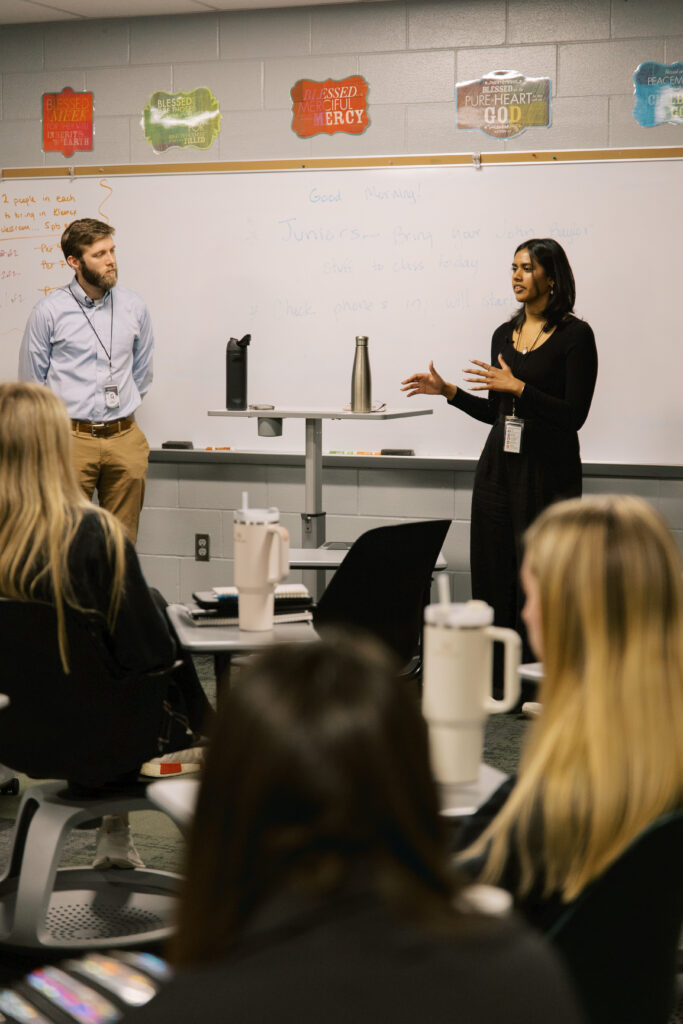
Missionaries speak last school year at V.J. and Angela Skutt Catholic High School in Omaha. THE CULTURE PROJECT
The Culture Project’s approach is not what young people are used to seeing on social media, with “people just kind of yelling at each other,” Fike said.
The Culture Project missionaries approach sensitive topics “with the delicacy that they deserve. Because when you have people coming in and talking about abortion in a very abrasive way or just talking about really any kind of sin in an abrasive way, that’s not attractive.”
Listening to people leads to understanding them, he said. The missionaries can’t dismiss the difficulties young people are going through as they make decisions about abortion, gender identity and same-sex attraction.
“If you don’t meet them with that delicacy,” he said, “then there’s not a conversation that’s going to be had.”
The missionaries address hot-button topics, Fletcher said, but they are well formed in building relationships “and receiving people where they’re at, listening to them, being receptive to their perspective.”
“They’re willing to talk about the hard stuff,” she said, “which these students are often surprised to hear. They’re just not used to people being willing to address the elephant in the room for them, something that’s a big part of their life, but that they’re really uncomfortable talking about, whether it’s pornography, addictions, dating.
“Most teachers want to stay away from that … because that’s a recipe for controversy.”
“But these missionaries exist to talk about the hard stuff.”
Fletcher shared how one student in particular felt like he was being heard and understood by the missionaries and felt free to be himself with them. After a retreat, he said, “I felt like they really understood my perspective.”
This was a student “who’s, frankly, a very difficult kid to reach,” the campus minister said. “He’s a very thoughtful kid, but he is also very stubborn, as many teenagers are.” The student’s heart had been hardened, she said, “but something about what The Culture Project missionaries said softened it. And something about that talk was really important for him.”
“I’ve really loved seeing our students sort of come alive around them, laugh with them, share music tastes,” Fletcher said of the missionaries. They’re “usually fresh out of college … so they’re very much in touch with the language of young people and the hearts of young people.”
“I’ve enjoyed spending time with them and getting to know them,” said Conner Thomassen, a senior at Roncalli.
“They’re faithful and well trained and working on a good mission. And they’re fun too!”
“They’re good at opening doors and starting conversations,” he said.
The missionaries’ dedication has impressed Jordan Martinez, a junior at Roncalli, who is on track to fully enter the Catholic Church at Easter. “They always try to see everything … through the eyes of God and try to be as helpful and charitable as possible every time they visit.”
“I love what I see,” Fletcher said. “I love seeing these kids build those relationships with people who I know have their best interest in mind and have their salvation in mind.”
The missionaries are good at responding to specific needs of this generation, she said, which has been heavily impacted by social media and the COVID 19 pandemic.
The students “know that life is not very good right now,” she said. “They know that the world is messy. They know that emotions are high across the board. They know there’s divisiveness. They know that marriages are failing. They’re seeing it. They’re living it.
“Finally, though, there’s a place to go to have these conversations.”
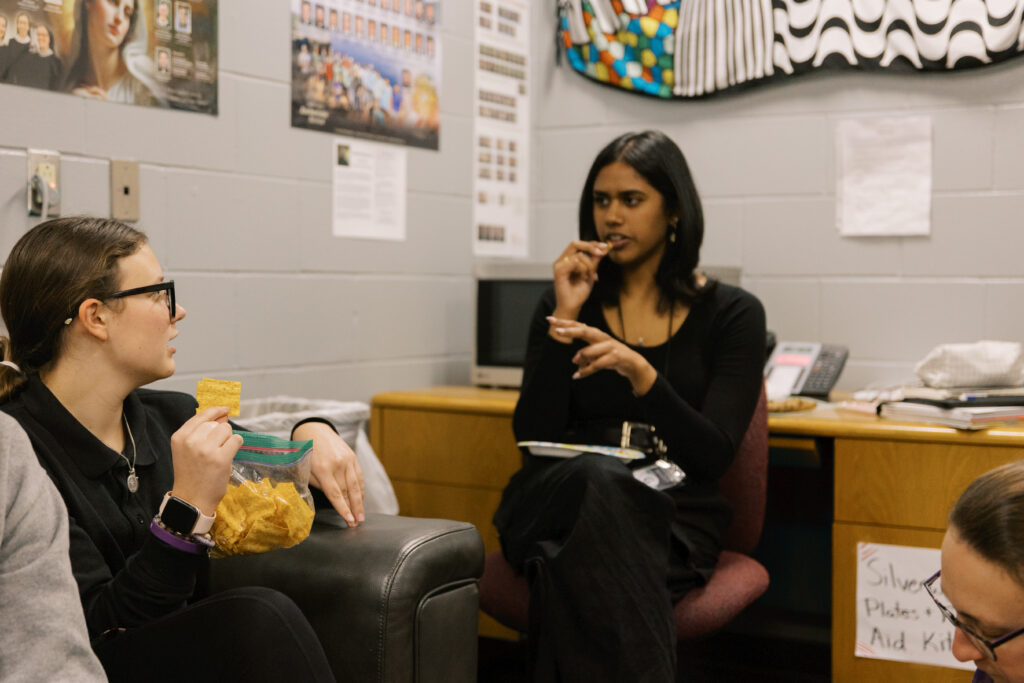
A missionary shares chips and a conversation with students at Skutt Catholic. THE CULTURE PROJECT
“I’ve been extraordinarily grateful to have them, and I can’t say enough good things about them,” Fletcher said.
“I’ve never seen people who handle themselves more graciously, more prudently, more carefully” when dealing with sensitive topics.
“They treat marriage and sexual activity as good things,” Fletcher said. “They treat them in a good way, with a caveat, in their proper context. These things are good for human beings, and they’re good for us as a society.”
“It’s about the freedom that comes from a virtuous life, and these Culture Project missionaries model that even as they talk about it.”
Surveys of students and teachers indicate the outreach is impacting attitudes and behaviors, Schleppenbach said. “We have the data.”
The Culture Project also has anecdotal evidence provided by students, teachers and parents who share with the missionaries.
“I think we’ll continue to see a greater impact the longer they’re around,” Phillips said.
The Culture Project and the archdiocese have agreed to five years of missionary service. The archdiocese is currently in the second year of that agreement, but the partnership could be extended beyond five years.
The missionaries’ schedule for the remainder of this calendar year is full, Phillips said, but the missionaries have more availability for interested schools and parishes in the new year.
“I encourage schools, parishes, youth ministries and young adult programs in northeast Nebraska to invite missionaries from The Culture Project to speak and minister to their members,” Archbishop Lucas has said.
For more information, contact Phillips at jmphillips@archomaha.org.
A donor couple has been funding The Culture Project’s work in the archdiocese so far, she said, but more donors are needed. “The hope is that we would invite other people into the mission, so that it pays for our partnership.”
The funding helps pay for missionary training and for their support staff.
To help support the Culture Project in the archdiocese, contact the Archdiocese of Omaha Stewardship and Development Office at 402-557-5650.
“I take comfort that these Culture Project missionaries aren’t permanent missionaries most of the time,” Fletcher said. “They do it for a year or two, and then they go off and live life, and they serve in parishes, and they have jobs.”
But the missionaries will always bring their formation with them, and the culture will continue to shift because of them.
“I pray for the continued success of The Culture Project,” Archbishop Lucas said, “in its work to build a culture that reflects the joy of Jesus Christ in a world so in need of His light.”
READ MORE FROM THE CATHOLIC VOICE: